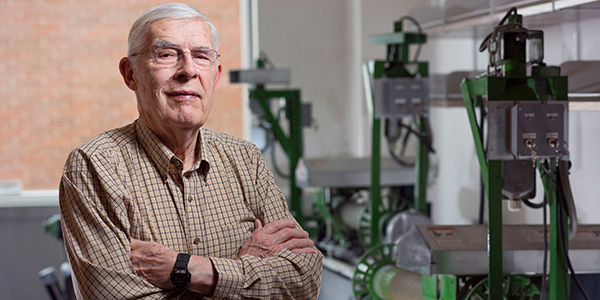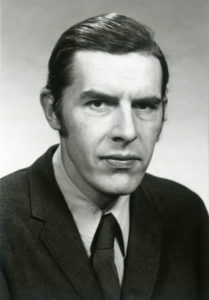
50 Years Powering Student Success
It was August 1967 when Carl Bern first walked into a classroom at Iowa State University. He began his career in agricultural engineering as a teaching assistant, and has taught students at Iowa State every term since.
Over the past 50 years, Bern, a University Professor of agricultural and biosystems engineering, has seen immense changes in technological innovation. He explains the “founding fathers” of agricultural engineering created four sub-disciplines reflecting engineering needs in agriculture: soil and water, power and machinery, structures and environment, and electric power and grain preservation.
Between 1920-1970 almost all farms in the United States became connected to line power, and agricultural engineers were a key part of this effort.
“Electric power on farms transformed the life of farm families. They were no longer limited to sunlight hours or candles and lanterns. It impacted their home life, too. It’s the pits to have to do homework by candlelight,” Bern says.
The first use of electric motors on the farm was usually to power fans and conveyors for grain preservation, according to Bern. Grain preservation became his primary research focus, and he taught many courses and mentored several students researching the topic.
One of his former students is now chair of his department.
“Dr. Bern was a very caring academic adviser and instructor. He was always available to answer questions and wanted to ensure students understood what he was teaching. He engaged students in active learning and made it fun to learn,” says Steve Mickelson, professor and chair of the Department of Agricultural and Biosystems Engineering.
In 2013 Bern began a part-time appointment. He guest lectures and teaches labs in an introductory agricultural and biosystems engineering class. He says this allows him to focus more on the three things he enjoys most: mentoring students, research and travel.
“In 2007 my wife and I went with a church group to Tanzania, and noticed corn stored on farms by smallholder farmers was frequently riddled with weevils. I saw the weevils there are the same as in Iowa, and I thought to myself, ‘I can use engineering to do something about that,’” Bern says. “Smallholder families depend on their stored corn for food. Losses to maize weevils can be devastating.”
As he talks about the trip that inspired his current work on grain storage in developing countries, a tiny maize weevil, Sitophilus zeamais, crawls up the wall inside his office in Elings Hall. With a laugh, he says a few of the insects must have found their way out of a shipping container from an order he received the previous week.
Bern says he’s looking forward to continuing his international work and mentoring students.
“I’ve been so fortunate to be given the opportunity to be part of this faculty, working in world-class facilities. It means everything to me, and is a central part of my life. I’m very blessed to be sitting here 50 years later,” says Bern.




